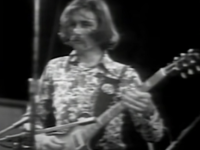Gregg Allman and Dickey Betts discussed the 40th anniversary of the Allman Brothers Band’s legendary Eat A Peach on the syndicated rock radio show InTheStudio, going in depth on the tragic death of Duane Allman during the recording sessions.
“You know the Eat A Peach record was pretty strange to us,” Betts tells show producer Redbeard, “’cause, that’s when Duane was killed, right in the middle of that recording. We kinda went through a whole lotta stuff.”
Allman, killed October 1971 in a motorcycle accident, has since been ranked No. 2 in 2003 on Rolling Stone magazine’s list of 100 greatest guitarists of all time, second only to Jimi Hendrix.
“That (Duane’s death) changed the arrangement of the songs,” Gregg Allman adds. “It was like two different projects. We used some of it on each one. It was a strange time back then.”
InTheStudio, syndicated on more 50 radio stations throughout North America, aired the Allman Brothers segment as part of its “Stories Behind History’s Greatest Rock Bands” series this week. Go to the InTheStudio site to stream the show online.
Here’s a look back at our recent thoughts on the Allman Brothers as well as solo projects from Gregg and Duane Allman. Click through the titles for complete reviews …
ONE TRACK MIND: THE ALLMAN BROTHERS, “MELISSA” (1972): Long before I was able to digest the epic, twenty-five minute meandering noodlings of Dicky Betts and Duane Allman, I deeply dug the Allman Brothers’ “Melissa.” It’s a wistful, country-flavored ballad that was easy to learn how to play on a beat-up Yamaha acoustic guitar, and since it was one of the more popular cuts from Eat A Peach, I’m sure I wasn’t the only kid who tried to take it on. The beauty of Gregg Allman’s classic tune doesn’t rest on any fancy playing, although Betts’ beautifully lonely guitar notes adds to the sorrow. Rather, the essence of the song can be found in Gregg’s ragged, weary vocal that sings about a restless travelling loner, a “gypsy” who longs for the comfort of Melissa waiting at home.
ONE TRACK MIND: BOZ SCAGGS AND DUANE ALLMAN, “LOAN ME A DIME” (1969): Forget that Scaggs delivers only an uncharacteristic so-so vocal performance on it. Forget that he covered this Fenton Robinson song and tried unsuccessfully to pass it off as his own. None of that matters. Not when this track is essentially a showcase for the electric guitar skills of one Duane Allman. Only one word I’m going to use to describe Duane’s contribution to this selection: dayum.
THE ALLMAN BROTHERS BAND – ONE WAY OUT (2004): The tendency for bands like this — bands that are known for their jamming — is to just rely on jamming, period. This has always been my problem, I find that most of the bands who jam simply lack the chops and taste to maintain my interest for long as they fall back on repetition and simple variations of riffs. The Allman Brothers Band perfected the art of jamming long ago, and One Way Out doesn’t lack for it. Numerous tracks venture past the 10 minute mark, but don’t drag on so long that you forget what song you’re even listening to. What could be an aural mess is just the opposite. The mix on One Way Out is fantastic – so clear that everyone’s parts are exquisitely defined, each being given plenty of room and space and yet it never sounds weak. One Way Out is just plain fun to listen to.
GREGG ALLMAN – LOW COUNTRY BLUES (2011): This record’s hat-tips to blues, R&B, gospel and jazz only underscore how each provided uniquely American spices in the Allman Brothers Band’s bubbling Southern-rock synthesis. Even so, it could have been recipe for a snoozy conversation piece if not for Allman — the archetypical risktaker. Check out the appropriately fidgety edge he adds to Muddy Waters’ “I Can’t Be Satisfied,” as Allman dirties up a Chess-era groove. Other highlights include a devastatingly frank update of Sleepy John Estes’ “Floating Bridge,” with a surging assist at the piano from Dr. John; Junior Wells’ “Little by Little,” transformed into something resembling a lost soul side from the 1950s; Skip James’ “Devil Got My Woman,” which again reveals the lively intellect of guitarist Doyle Bramhall II; and Amos Milburn’s hardy R&B classic “Tears, Tears, Tears,” where Allman — belying a series of serious health problems — howls with a shanty-shaking, soul-rending power. He’s still got it. Every bit of it.
[amazon_enhanced asin=”B0002IQAMW” container=”” container_class=”” price=”All” background_color=”FFFFFF” link_color=”000000″ text_color=”0000FF” /] [amazon_enhanced asin=”B000001FLK” container=”” container_class=”” price=”All” background_color=”FFFFFF” link_color=”000000″ text_color=”0000FF” /] [amazon_enhanced asin=”B004I4H8QS” container=”” container_class=”” price=”All” background_color=”FFFFFF” link_color=”000000″ text_color=”0000FF” /] [amazon_enhanced asin=”B004AHNIGM” container=”” container_class=”” price=”All” background_color=”FFFFFF” link_color=”000000″ text_color=”0000FF” /] [amazon_enhanced asin=”B0001JXOUI” container=”” container_class=”” price=”All” background_color=”FFFFFF” link_color=”000000″ text_color=”0000FF” /]



